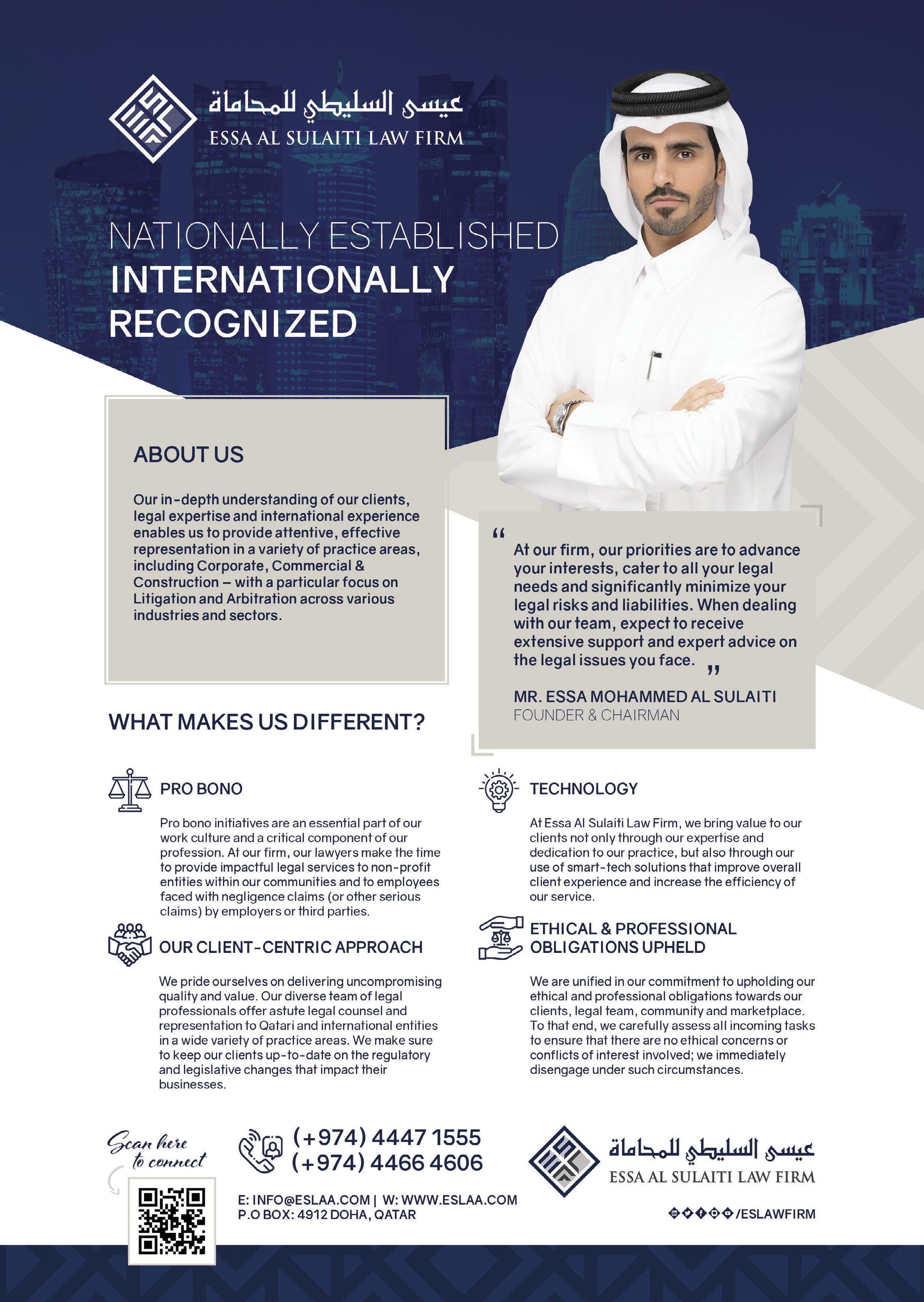FEATURE BUT WHO BENEFITS?
Omani legislation on real beneficiaries
PROFILE PROPERTY

Haytham Alieh of DAMAC Group
CONTRACT WATCH
Cloud Service Contracts
A ROUND-UP OF LEGAL, FINANCE AND TAX DEVELOPMENTS ACROSS THE MIDDLE EAST

March / April 2023 www.lexis.ae
IN GOOD COMPANY? Compliance with the new Saudi Company law regime
Pinsent Masons’ reputation in the legal market is second to none. With the largest team of infrastructure and energy lawyers in the Middle East, as well as lawyers specialising in corporate, technology science and industry, and real estate, we understand the unique issues that affect businesses here. We offer an unmatched depth of knowledge and expertise and advise on a broad range of transactions and disputes in Qatar across our core sectors. In recognition of our experience, we have been named International Law Firm of the Year by LexisNexis awards and are recommended as the go-to firm for advice in the region by all leading directories.
If you would like to hear more about how our lawyers can help you throughout the Middle East from our offices in Qatar, the United Arab Emirates, Saudi Arabia and our network across the region, please contact the individual below who would be delighted to tell you more about our services and introduce you to colleagues across the region.


Office +974 442 69222 +974 5030 3480 pamela.mcdonald@pinsentmasons.com
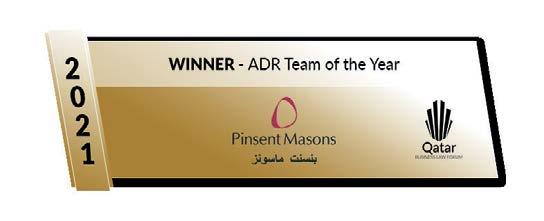
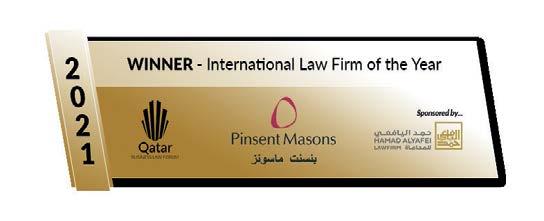
East
of Doha
www.pinsentmasons.com A PURPOSE-LED PROFESSIONAL SERVICES BUSINESS WITH LAW AT THE CORE © Pinsent Masons
As the leading advisor to the Middle
we help you meet your regional challenges Pamela McDonald Partner, Head
391867
The Lexis Middle East Law Alert magazine is produced by the Lexis Middle East Law online legal and business research service. To find out if you qualify to be added to our regular circulation go to: www.lexismiddleeast.com
Follow us on Twitter: https://twitter.com/lexismiddleeast
ADVISORY BOARD
Zaid Mahayni (IT Services)
Radwa Salah Elsaman (Technology)
Fawaz M A Alawadhi (Consumer)

Lorenzo Bruttomesso (Energy)
Justin Dowding (Online Media)




EDITORIAL
Editor

Claire Melvin +44 (0) 20 7347 3521 claire.melvin@lexisnexis.co.uk
MIDDLE EAST REGIONAL SALES
Abbey Bergin abbey.bergin@lexisnexis.com +97145601200


PRODUCTION
Senior Designer
Jack Witherden
ENQUIRIES
UK
LexisNexis, Quadrant House, Sutton, Surrey, SM2 5AS
Tel: +44 (0)20 8686 9141 or Fax: +44 (0)208 212 1988
France
LexisNexis SA, 141 Rue de Javel, 75015, Paris
France
Tel: +33 (0) 1 45 58 90 43
This product comes from sustainable forest sources.
Reproduction, copying or extracting by any means of the whole or part of this publication must not be undertaken without the written permission of the publishers.
This publication is intended to be a general guide and cannot be a substitute for professional advice. Neither the authors
© 2023 Reed Elsevier.
CONTENTS
COMPANY MATTERS
In this issue we cover significant company law changes in two GCC jurisdictions - Saudi and Oman. In Oman the focus has been on tackling money laundering risk by new requirements on identifying the ultimate beneficial owners of companies. Meanwhile, in Saudi Arabia, the authorities have been keen to use legislative change as a means of encouraging foreign investors to establish themselves in the country. A new company law was issued in 2022 and its implementing regulations which provide the detail companies need to make the necessary changes were issued at that start of this year. Although a two-year Grace Period was put in place, some of the relevant provisions of this new region are already in force. It is clear too as steps will have to be taken to make changes to areas including company articles of association and by-laws, inhouse lawyers should be looking at this new legislative framework now so they can begin making the necessary changes. However, the new Saudi company framework is not the only change there which could lead to companies thinking about their next steps. At the end of 2022 a resolution approving the Regulations of Government Agencies Contracting with Entities that do not have a Regional Headquarter in Saudi Arabia and their related parties was also issued. The Regulations come into effect on 1 January 2024 and prevent all Saudi government agencies, when carrying out their works and securing procurements, from contracting with companies that do not have regional headquarters (RHQ) in Saudi. As a result, companies interested in public sector work and contracts in Saudi Arabia will probably also want to start taking a look at their corporate structures. It is an area where a lot of thought and advice will be needed in the near future, so perhaps it not surprising as you can see from the Movers & Shakers column in this issue, a number of regional law firms are currently expanding their operations and the capacity of their corporate law teams there.
Claire Melvin - Editor
FEATURE: IN GOOD COMPANY p2
The new Saudi Company Law regime

FEATURE: BUT WHO BENEFITS? p12
Omani changes on ultimate beneficial owner reporting
FEATURE: CASE FOCUS p16
A case on costs of those unrepresented
LEGAL ROUND-UP p6 including the DIFC Family Arrangement regulations

LAW MONITOR p8 including amendments to the Qatari Corporate Income Tax Law
TAX AND FINANCE ROUND-UP p10 including tax guidance on e-commerce reporting
IN-HOUSE PROFILE
Hatham Alieh > Property p19
A Vice President of Litigation on technological law change
MOVERS AND SHAKERS p21
Round-up of the big moves across the region
DISPUTE RESOLUTION FOCUS p24
CONTRACT WATCH p28
Cloud service contract
nor the publisher accept any responsibility for loss occasioned to any person acting or refraining from acting as a result of material contained in this publication.
| Lexis Middle East Law Alert | March / April 2023 | www.lexis.ae 1
Justin Dowding ByteDance & TikTok
Radwa Salah Elsaman Tetra Tech Fawaz M A Alawadhi Alghanim Industries Lorenzo Bruttomesso Oman LNG L.L.C
Zaid Mahayni Sedco Holding
IN GOOD COMPANY?
A new Saudi company law regime came into force on 18 January 2023. As Alan Sfeir and Shahd Makhafad of Clyde & Co explain, despite a two-year Grace Period companies need to consider this regime and other regulations coming into force in 2024 in order to decide what they need to do and when.
“On 18 January 2023, a new Saudi Arabian company law regime came into force,” states Alain Sfeir. “Saudi Arabia Cabinet Decision No. 678/1443 and its Implementing Regulations (Saudi Arabia Ministerial Decision No. 284/1444) have replaced both the previous Saudi Arabia Royal Decree No. M3/1437 which dates back to 2015 and the Professional Companies Law Saudi Arabia M17/1441 and its regulations which were was approved in 2020, as well as any other Regulations which contradict the new company law and its Implementing Regulations.“
WHAT IS NEW?
Alain Sfeir Corporate Partner, Clyde & Co

legal company structure, the simplified joint stock company corporate form. This is a unique company structure which is not widely seen in other jurisdictions.”
“In addition, separate agreements between partners and shareholders which were not regulated under the previous company law regime are now recognised. Steps have also been taken to make company administration easier,” Sfeir adds. “For example, the procedures for setting up a company in Saudi are now simpler and less steps are required. In addition, electronic means can also now be used in various corporate operational and management areas.”
Shahd Makhafah Senior Associate, Clyde & Co



“This new regime has a number of significant new features,” states Shahd Makhafah. “For example, there is now a new
“There are also a number of key changes to directors’ obligations on areas including duty of care, duty of loyalty, conflict of interest, and competition,” Makhafah continues. “There is also now flexibility in determining different classes of shares with no monetary restrictions on the selected value of shares, and there have been additions to contract terms such as the recognition

L AW FOCUS www.lexis.ae | March / April 2023 | Lexis Middle East Law Alert | 2
of the tag-along and drag-along rights (co-sale rights) for both joint stock companies and limited liability companies subject to including the required terms under respective articles of association/bylaws (as the case may be) which are designed to give minority shareholders more protection. It should also be noted that the new Companies law will require existing Saudi companies to make a number of changes in areas including their corporate documents, procedures for share valuations, criteria for selecting auditors, and on conditions for distributing profits.”
WHEN DO CHANGES HAVE TO BE MADE?

“Although the new regime came into force on 18 January 2023, a two-year Grace Period has been put in place for companies to make some of these changes,” Sfeir explains. “However, it should be noted that this Grace Period does not apply to companies which incorporated and entered the Saudi market after 18 January 2023. In addition, provisions which have continued over from the previous Saudi company law regime and are found in the new
RELEVANT LEGISLATION
Article 63 of Saudi Arabia Cabinet Decision No. 678/1443 On the Approval of the Companies Law
The Ministry and the Authority may set the controls and procedures and determine the necessary documents and approvals for the incorporation of a Joint Stock Company whose shares are offered for public subscription during the incorporation phase or they are listed on the financial market.
(Source: Lexis Middle East Law)
legislation apply immediately to all entities. At present the main task for existing Saudi companies looking to comply with the new regime is to amend Corporate Documents such as their articles of association and company by-laws.”
“The Ministry of Commerce and Capital Market Authority have also stated that any amendments to a companies’ Corporate Documents during the Grace Period, will require the company to undertake a full amendment to their respective constitutional documents so they all comply with the new regime. It
L AW FOCUS | Lexis Middle East Law Alert | March / April 2023 | www.lexis.ae 3
© Getty images/iStockphoto
RELEVANT NEWS
Regional Headquarters Programme
The Saudi Ministry of Investment (MISA) has published additional guidance on the Regional Headquarters programme which aims to to incentivise foreign companies to set up their regional headquarters in Saudi. According to the MISA’s guidance, the initiative is aimed at companies doing business in more than one jurisdiction, who wish to establish their presence in Saudi Arabia for the purpose of supporting, managing, and providing strategic direction to branches, subsidiaries and affiliates operating in the MENA region (including Algeria, Bahrain, Egypt, Iraq, Jordan, Lebanon, Libya, Mauritania, Morocco, Oman, Palestine, Saudi Arabia, Syria, Tunisia, the UAE and Yemen). A Regional Headquarters business license is issued by the MISA for up to five years. The investor must have a presence (either through subsidiaries or branches) in a minimum of two different countries other than Saudi Arabia and the country of incorporation of its headquarters. The Regional Headquarters must be established as a separate legal personality in Saudi Arabia or as a registered branch of a foreign company. They must perform strategic direction and management functions as mandatory activities within six months of receiving their license. This includes formulating and monitoring the regional strategy, supporting mergers and acquisitions, and also reviewing financial performance.
is also necessary for all procedural requirements which apply to entities and their management to be complied with.”
“In addition, despite the Grace Period there are also certain provisions in the new regime, for example those relating to crimes and offences, all companies have to tackle now,” Makhafah adds.
“The new regime classifies crimes as either primary, secondary or low-level offences. Primary offences include provisions on the falsification of records and/ or reports, providing misleading information about the company’s financial position, and using company funds and/or a granted position or authority contrary to the company’s interest for personal interest or gain, whether that is directly or indirectly. The potential penalties in this case are imprisonment for up to three years and a fine of up to 5,000,000 Riyals.
“Secondary offences include in general, cases of dishonesty, such as an auditors’ failure to disclose wrongdoing, public employees disclosing company secrets, directors who obtain benefits in exchange for voting in a certain way or who fail to call for a general assembly meeting or take the necessary action after becoming aware of a company’s financial losses. In these cases, the penalty would be imprisonment of up to one year and a fine of up to 1,000,000 Riyals.”
“Meanwhile, low level offences such as failure to organise required regular shareholder meetings, or provide authorities with any required documentation when requested; and/or to remedy and take necessary corrective action where there are violations of the new company law regime, can lead to fines of up to 500,000 Riyals.”
OTHER RECENT COMPANY LAW CHANGES
“On 27 December 2022 the Saudi Council of Ministers also issued a resolution approving the Regulations of Government Agencies Contracting with Entities that do not have a Regional Headquarter in Saudi and their related parties,” Makhafah states.
“The Regulations come into effect on 1 January 2024 and prevent all Saudi government agencies, when carrying out their works and securing procurements, from contracting with companies that do not have regional headquarters (RHQ) in Saudi. Foreign companies that do not have a RHQ in the Saudi are defined as ‘foreign companies that do not have a RHQ in the Saudi Arabia and have a RHQ in the Middle East and North Africa Region and are included in a list which is going to be prepared and maintained by the Ministry of Investment (MISA)’. The Regulations also restrict government agencies from contracting with any related parties to these companies that do not have their RHQ in Saudi.”
“In this context a related party is any agent for companies that do not have a RHQ in Saudi Arabia, or any distributor, supplier or provider of their goods or services with respect to those goods and services.”
“Subject to specific conditions, there are some exceptions to these prohibitions and these rules do not apply to government work or procurement with an estimated value of less than 1,000,000 Riyals or where the works is to be executed outside Saudi Arabia. However, it should be noted that these rules apply to all government agencies and not just those subject to the Government Tenders and Procurement Law Saudi Arabia Cabinet Decision No. 649/1440).”
“Therefore, it is advisable for new investors and existing entities in the Saudi market to start looking at both these regional headquarter requirements and the new company law regime there,” states Sfeir.
“Companies who want to participate in any government related projects or would like to continue working with government authorities or departments, should be assessing what will be the most suitable legal structure for their operations and have any necessary changes in place prior to 1 January 2024.”
WHAT IS HAPPENING NEXT?
“Further announcements and regulatory guidance on the new Saudi company regime are also expected to be issued in due course by government authorities,” states Sfeir. “These will include clearance on the unified standard templates to be used by companies for their Corporate Documents.”
“All existing Saudi companies or new investors considering entering the Saudi market, should be looking at the new company law and its implementing regulations now,” Makhafah adds. “They should also be looking at how the new RHQ programme and implement any structural changes they may need to make to their company. They should take necessary advice on both what the best corporate structure will be for them in Saudi Arabia going forward, and what will be the most suitable timeframe for them to make the various changes they will have to make to ensure they are adhering to the new company law framework in Saudi Arabia.”
L AW FOCUS www.lexis.ae | March / April 2023 | Lexis Middle East Law Alert | 4
AlBaker & Associates Law Firm, is a specialized legal group that provides litigation & consultations services for local and foreign commercial business and entities. Where is the believe that specialization is key factor of legal professionalism that is rare in the state of Kuwait, the firm provides its services in commercial, companies, business, CMA, SME’s, IT, mobile applications & electronic platforms laws and sectors.

T: (+965) 22404987 / 22406862



































































E: info@albakerlaw.com Chamber of Commerce & Industry, 2nd Floor, Kuwait.

























www.albakerlaw.com

SPECIALIZED UNIQUE LEGAL SERVICES THAT MEET YOUR REQUIREMENTS AND CONTRIBUTE TO ACHIEVING YOUR GOALS AND ASPIRATIONS.
COVERING RECENT KEY LEGAL DEVELOPMENTS – REGION-WIDE
UAE UNEMPLOYMENT INSURANCE
Further clarifications on the unemployment insurance scheme covered in Federal Decree-Law No. 13/2022 have been provided. This mandatory insurance is designed to provide employees with three-months income equivalent to 60 per cent of their salary if they leave work for reasons beyond their control or which are non-disciplinary. It has been confirmed that this insurance cannot be assigned to others or transferred to any other individual or company at any time.
SHARJAH SOCIAL ACTIVITY REGIME
Sharjah’s Social Services Department has begun issuing licenses for service providers to operate social activities there. This follows Sharjah Executive Council Decision No. 23/2022 on the regulation of social activity service providers. All establishments, whether they are for-profit or non-profit, will have to obtain prior approval from the authority before offering any social services. These services include day care, housing, house care, consultancy, training, and education.
DIFC VENTURE STUDIO REGULATIONS
The DIFC has proposed new regulations which will regulate the workflows of Venture Studios and establish a legal framework for building projects and launching companies in the freezone. This will be the first global legal framework regulating venture building. The proposed regulations provide a legal framework that enables scaling of businesses; the ability to develop, test and launch new start-ups; and supports venture builders, entrepreneurs and investors. The regime will also provide
certainty on how venture studios, entrepreneurs and spin-off entities deal with each other and the wider market. In addition, it will facilitate the ease of doing business within the venture studio model, and specific operational measures will be implemented to enable the incubation of new business ideas, sponsorship of entrepreneurs and to reduce the costs for scaling new businesses. Details of the proposals are covered in Consultation Paper No 1. of 2023. The consultation period is scheduled to end on 19 March 2023.
FAMILY ARRANGEMENT REGULATIONS
Following a consultation and the launch of a Family Business and Private Wealth Centre, the DIFC has issued new Family Arrangement Regulations. These provide for the engagement of family businesses within the DIFC, and take account of UAE Federal and onshore Dubai enactments including Federal Decree Law No. 37/2022 (the UAE Family Business Law). They also repeal and replace the DIFC Single-Family Office Regulations and DIFC’s Single Family Office regime. Family Offices will no longer need to register as a DNFBP (Designated Non-Financial Business or Profession) with the Dubai Financial Services Authority (DFSA) unless they provide these services to more than one family as a business. There will be a private register for Family Entities and Family Offices and a specially designated register for the registration of Family Businesses.
ABU DHABI PENSIONS SERVICE
The Abu Dhabi Pension Fund has confirmed it automatically includes previous service periods of individuals who are registered with the Fund from both the private and public sectors. This is done at no extra cost to the insured person. If an insured person
has received their end of service payment and later decides to add their previous service period to the scheme, they must pay a fee equivalent to 26 per cent of the salary used as the basis for calculating their subscriptions. Service periods which can be added include previous periods of work with the UAE Federal government, previous work in the private and public sectors in the Emirate of Abu Dhabi, previous work periods in the private sector outside the Emirate of Abu Dhabi, and previous service in local authorities in the UAE, provided conditions detailed by law are met.
SAUDI ARABIA CHANGE ON WHITE LAND
The Municipality, Rural, and Housing Affairs Ministry is to modify the White Land Fees System and its executive charter to include residential and commercial use. The regime is designed to penalise landowners who fail to develop their land on a timely basis by charging them a fee. A 2.5% fee on the land value is to be introduced. The committee will be able to collect fees of up to 10% of the estimated land value within certain limits, based on criteria established by the ministry. Landlords will have to provide documents and information on their property within specified timeframes.
COMPANY SIZE
Saudi Arabia’s Small and Medium Enterprises General Authority has drawn up new regulations which will be used to determine the size of an enterprise when considering compliance with the Cabinet Decision on the SMEs Economic and Statistics Information Centre. This is designed to help reduce government revenue loss and prevent abuse of benefits provided to micro, small, and medium enterprises. To qualify for this status companies will have to obtain a certificate confirming their size by submitting documents including a valid commercial registration and their enterprise status file.
LEGAL LEGALROUND-UPROUND-UP
www.lexis.ae | March / April 2023 | Lexis Middle East Law Alert | 6
BUILDING CODE
Saudi ‘s Trade Minister has given the green light to changes in the implementation of the Building Code executive regulations which are intended to improve the stability of buildings, help conserve water and energy, and better protect the public from hazards such as fires and earthquakes.
There will also be new procedures and controls for getting building permits. Engineering plans will also have to meet specific criteria.
VIRTUAL ASSET REGIME
Omani Capital Market Authority (CMA) plans to regulate the virtual asset market by introducing a Virtual Assets Regulatory Framework for Virtual Assets (VAs) and Virtual Asset Service Providers (VASPs).
The CMA wants to offer an alternative financing and investment platform while reducing VA risks.
They will provide a comprehensive regulatory framework, including new regulations, a licensing framework, and a supervisory framework to govern crypto activities, tokens, crypto exchanges, and initial coin offerings.
QATAR PERMANENT RESIDENCE
Under Qatar Law No. 10/2018 On Permanent Residence those making applications must have a sufficient lawful source of income to support themselves and their dependents. For public sector employees this is 20,000 Riyals but private sector employees must have a total salary of at least 30,000 Riyals. In addition, they must also have resided in Qatar for a minimum of 20 years if they were born outside the country or 10 years if they were born inside it.
CONSTRUCTION MATERIALS
The Qatar Trade and Industry Minister has decided to suspend the implementation of a new law Qatar
Ministerial Decision No. 30/2023 which was due to bring in regulations on subsidised construction materials. The Decision is to be suspended pending a review during which amendments will be considered.
This follows concerns about the impact of the decision on nationals who currently benefit from subsidised materials with which to construct their homes.
The procedure used to distribute construction materials to nationals building their homes will remain as it was before the Ministerial Decision was issued.
KUWAIT CONFLICTS OF INTEREST
The Kuwait Capital Market Authority (CMA) has published a circular on conflicts of interest. The circular aims to explain situations in which companies and their employees will be considered as being in a position where there is a conflict of interest. It also covers companies to which the state or other public agencies contribute.
All companies subject to supervision under Kuwait Law No. 7/2010 On the Establishment of the Capital Market Authority and Regulation of Securities Exchange Activity, its Executive Bylaws and amendments must comply with Kuwait Law No. 1/2023 Concerning the Prevention of Conflicts of Interest on requirements to provide written notification when a conflict of interest arises.
BAHRAIN LABOUR REGISTRATION DEADLINE
A 4 March 2023 deadline was set for the registration of illegal labourers and flexible permit holders to be completed.
There will be no exceptions and those who fail to register with the Labourer Registry by this date will be subject to action under Bahrain Law No. 19/2006.
As a result, deportation and inspection campaigns have been intensified in all Bahraini provinces and commercial markets in coordination with the relevant government authorities.
REGULATORY ROUND-UP
UAE: A new Emirates Media Council is being established and will be responsible for proposing regulations, laws, and standards and licensing of media activities...
UAE: Federal Law No. 3/2022 On the Regulation of Commercial Agencies will come into force on 16 June 2023,..
Bahrain: A Shura Council committee has recommended the ratification of the Bahrain-Oman maritime and ports cooperation agreement which aims to promote trade between the two countries and ensure maritime safety under Bahrain Decree No. 3/2023...
Dubai: The Dubai Government will no longer charge the 10% or 10 AED minimum on event tickets...
Oman: Ministry of Commerce, Industry and Investment Promotions Inspectors are checking shops which are making above inflation food price increases and issuing fines of 2,000 Rials..
Jordan: The Jordanian Parliament is considering amendments to the Competition Law which would impact the dominant market position classification...
Iraq: A temporary suspension on imports of essential goods for citizens has been lifted to reduce domestic prices...
Saudi Arabia: The Investment Ministry has issued guidelines on how to obtain an entrepreneurial licence...
UAE: Visitor Visa holders who wish to extend their visa by 30, 60, or 90 days can do so on the Federal Authority for Identity, Citizenship, Customs, and Ports Security’s smart platform...
Qatar: The Qatari Cabinet has approved a draft law in principle which would see incentives given to entities which commit to employee nationalisation quotas and to Qatari workers who work for these entities...
Oman: A draft labour law has been referred to the Oman State Council...
Kuwait: It will now be possible for international companies to be directly contracted to undertake road maintenance in Kuwait...
Kuwait: The Capital Market Authority has launched the ‘Sahel’, which can be used to report crimes and violations of Kuwait Law No. 7/2010..
Kuwait: Use of cash and Knet for payment of goods in pharmacies is limited to 10 Dinars to prevent money laundering..
LEGAL ROUND-UP | Lexis Middle East Law Alert | March / April 2023 | www.lexis.ae 7
OMAN
Page word count 1 line heading (3 intro) = 500 words News in brief = 200 words
LAW MONITOR RECENT LEGAL DEVELOPMENTS IN THE GCC
KUWAIT - NATIONALITY
Several Kuwaiti MPs have submitted a Bill to the Parliament which would grant additional rights to the children of Kuwaiti mothers married to non-Kuwaitis. Entitlements under the proposed legislation would include granting these individuals permanent residency, priority in public sector recruitment after citizens, and the right to the national labour subsidy for those working in the private sector. In addition, it has been proposed that they would be able to establish their own companies or businesses in Kuwait, without having to have a Kuwaiti partner.
OMAN - ENERGY
Oman Sultani Decree No. 10/2023 On the Allocation of Some Land for the Purposes of Renewable Energy and Clean Hydrogen Projects has been issued. This law includes a map which has been marked where state-owned land is to be dedicated to renewable energy and clean hydrogen project use. No rights can be granted on this land and no dispositions of any kind can be made of it by the government entities without prior written approval from the Ministry of Energy and Minerals. The usufruct rights over this land have been granted to Oman Hydrogen Company. They can parcel up usufruct rights on this land and can contract with third parties to use the parcelled land for renewable energy and clean hydrogen projects.
SAUDI ARABIA - REAL ESTATE
Saudi Arabia Cabinet Decision No. 679/1443 On the Approval of the Real Estate Brokerage Law has been issued. The provisions of this law can apply to International Commercial Brokerages in certain circumstances, if the parties apply to be subject to this law. The law can be applied if the parties to an agreement were working in different countries at the time they concluded it or if the parties are working in a different state than the one where the contract’s fundamental obligations are to be executed.
GAZETTE WATCH GAZETTE WATCH
UAE Official Gazette No. 742-746 – These Gazettes included Ministerial Decision No. 36/2023 on symbols and phrases for one-person companies.
Saudi Arabia Official Gazette No. 4965 - 4974 –These Gazettes included Saudi Arabia Ministerial Decision No. 11/4/2022/1444 on Arbitration rules for Privatisation contracts.
Qatar Official Gazette No. 1-3 of 2023 – These Gazettes included Qatar Cabinet Decision No. 21/2022 on expropriation of some real estates for public benefit.
Oman Official Gazette No. 1476-1485 – These Gazettes included Oman Decision No. 7/2023 on the issue of a regulation for the prevention of business risks and land installations related to the water and wastewater sector.
Kuwait Official Gazette No. 1617-1626 – These Gazettes include Kuwait Ministerial Decision No. 37/2023 on the prohibition of cash transactions for the activity of private pharmacies.
(Source: Lexis Middle East Law)
BAHRAIN - CUSTOMS
The Shura Council has reviewed a report on Bahrain Decree-Law No. 45/2022 which approves amendments to certain provisions of Bahrain Decree-Law No. 10/2002 On the Approval of a Unified Customs Law for Gulf Cooperation Council State. The amendments allow exchange of information using electronic mediums or other telecommunications methods for customs clearance. They also enable goods to be cleared prior to their arrival at the Customs Department if they meet the requirements set out by the General Manager. The Shura Council has approved the committee’s recommendation to pass this law.
www.lexis.ae | March / April 2023 | Lexis Middle East Law Alert | 8
QATAR - PROPERTY FEATURED DEVELOPMENT
The Qatar Shura Council has approved a draft law which would amend Qatar Law No. 6/2014 Regulating Real Estate Development. The changes would include a definition of real estate developer obligations, establishing a special register for licensed practitioners, and regulating the relationship between developers and banks. Judicial authority would also be granted to the Real Estate Regulatory Authority employees and a licensing committee would be established which would issue licenses to real estate developers and companies managing and maintaining property under construction.
DUBAI - MARITIME
Dubai Law No. 3/2023 On Dubai Maritime Authority has appointed the Dubai Maritime Authority as the regulatory body which will be responsible for overseeing the maritime sector and maritime operations in the Emirate. As well as maritime matters in onshore Dubai, the Authority will also take regulatory responsibility for Dubai free zones and the DIFC. It is hoped this new law will help make the Dubai maritime sector better able to compete internationally.
Qatar Law No. 11/2022 brought in some amendments to the Qatar Corporate Income Tax Law (Qatar Law No. 24/2018). These changes are intended to widen the Qatar tax net and bring its legislation in line with international best practice and tax developments. A key change is the inclusion of the global minimum tax rate within Qatari domestic tax legislation for entities which fall within the scope of Pillar 2. As a result, entities which reside in Qatar and come within the scope of the Global Minimum Tax rule under the BEPS Pillar 2 proposals will be subject to a minimum effective tax rate of 15%. (The details of how this will work in practice will be included in a future amendment to Qatar Law No. 24/2018’s Executive Regulations.)
In addition, subject to certain conditions and controls, tax relief may apply in respect of foreign income tax paid outside of Qatar. In addition, the scope of taxable income has been widened and certain types of foreignsourced income are now subject to tax in Qatar. Income derived by Qatari projects (projects managed by residents in Qatar) from real estate and immovable property located outside of Qatar is also now subject to tax if that income is not linked to a foreign permanent establishment of the Qatari project. Dividends, interest and royalties which arise from foreign sources, that are paid by foreign companies outside of Qatar to Qatari projects are also now subject to tax, subject to the satisfaction of certain conditions. Tax will also now apply to foreign-sourced income from
the provision of various types of services, subject to certain conditions.
There have also been a number of changes to exemptions. For example, certain types of entities including non-profit organisations, private associations, and foundations of public interest which were previously out of the income tax law’s remit, are now instead treated as being exempt from tax. This means they should now be subject to compliance requirements such as filing tax returns and preparing audited financial statement. In addition, an exemption now applies to capital gains accrued on the disposal of various types of immovable and financial assets held outside of Qatar, and to movable assets which form part of a foreign permanent establishment owned by a Qatari project, including capital gains on the disposal of the permanent establishment. An exemption also applies to board of directors’ fees earned by Qatari projects from company residing outside of Qatar. There have also been changes to a number of definitions within the law, including the definition of a permanent establishment and the criteria for residency.
Another point worth noting is the introduction of mandatory report submissions on core activities performed in Qatar, is now required (although details of entities that are subject to these reporting requirements are still to be issued in the Executive Regulations). Entities that do not satisfy the core activities/physical presence requirements will be subject to a 15% penalty on their net income, and the General Tax Authority (GTA) could also refuse the issuance of a tax residency certificate to such entities.
LAW MONITOR | Lexis Middle East Law Alert | March / April 2023 | www.lexis.ae 9
Shiraz Khan, Saif Abdulelah, and Sofiane Bourennani of Al Tamimi & Company explain amendments to the Qatari Corporate Income Tax law which have been brought in by Qatar Law No. 11/2022.
TAX AND FINANCE ROUND-UP
COVERING RECENT KEY TAX AND FINANCE DEVELOPMENTS – REGION-WIDE
UAE
VAT ON BUILDING COSTS
The Federal Tax Authority (FTA) has clarified which building costs will be ineligible for VAT refunds when constructing a new house. The costs which have been excluded from these refunds include furniture, electrical appliances, decorative items like trees and plants, garden furniture and decorations, ceiling ornaments, swimming pools, and children’s play areas. The statement follows Federal Decree-Law No. 8/2017 On Value Added Tax, which allows Emirati nationals to request a refund of VAT on certain costs within one year of completing a new building, provided the items used are eligible for a refund.
REPORTING
The Federal Tax Authority (FTA) has issued a law and guidance on E-commerce reporting and tax - Ministerial Decision No. 26/2023 Criteria and Conditions for Electronic Commerce for Purposes of Keeping Records of the Supplies Made and the VAT Public Clarification VATPO33 Amendments to Emirates’ Reporting – Electronic Commerce Supplies by Qualifying Registrants. Generally, supplies should be reported in the Emirate where the taxable person’s establishment is most closely related to the supply. However, in late 2022, under amendments to Article 72 of the Executive Regulations of the VAT Law it was stated where the value of taxable goods and services through electronic commerce exceeded AED 100 million in a calendar year the taxable person must keep records of the transaction, to prove which Emirate the supply was ‘received’ in. Supplies of goods and services are an ‘electronic commerce supply’ if they are made by an ‘Electronic Commerce Medium’, where the Goods and Services are listed or advertised on an Electronic Commerce Medium; are ordered through the Electronic Commerce Medium, regardless of whether payment is made online; with supplies of Goods the Goods
are delivered to a location specified by the customer that is neither owned, nor operated by the Supplier; and for supplies of Services, the Services are provided, or the right to receive them is granted to the customer with minimal or no human intervention.
The reporting applies from 1 July 2023, and requires these services to be reported in Box 1 of the VAT return in the appropriate box for the respective Emirate. The rules apply to websites, portals, gateways, interface, platforms, marketplaces, APIs and similar applications.
ABU DHABI JOINT LIABILITY
The Abu Dhabi Court of Appeal For Family, Civil and Administrative Cases has overturned a decision made by the Court of First Instance, which had rejected a man’s request to order his wife to pay her portion of a loan they had jointly taken out to build properties on a piece of land they had been allocated. The Court of First Instance had appointed an expert who claimed the case documents did not prove the wife was also liable for the loan. However, her husband appealed stating his wife had signed relevant documents and did not deny her responsibility before the court. The Court of Appeal has now ruled in favour of the husband, stating the wife must pay her share of the loan.
SAUDI ARABIA VAT PENALTIES
The Zakat, Tax and Customs Authority (ZATCA) has issued a consultation on changes to their VAT legislation. The proposed changes include that there will be a penalty of 2% per month or part of a month if the taxpayer has not filed their VAT return within a specified period which would accrue until they had filed their return. The penalty would apply irrespective of whether the return is filed by the taxpayer
itself, or whether the amount is assessed by ZATCA. However, there would be a maximum cap of 24%. In addition, there would be a minimum fixed penalty of 1,000 Riyals for failure to file monthly returns within the specified period and a 500 Riyal minimum penalty for delays of over one month.
Fixed penalties would be doubled for repeat violations in the same calendar year. Changes are also proposed on the sale and seizure of property where there has been a failure to pay tax. The consultation ended on 12 March 2023.
SELECTIVE TAX
The Zakat, Tax, and Customs Authority (ZATCA) has made some changes to the Selective Tax Regulations. Companies will now be allowed to claim a refund for any goods subject to selective tax which have been destroyed. However, in order to be eligible, the company must submit their request within 12 months from the date of introducing the selected goods, and the total value of the selective tax which has been paid cannot exceed 3,000 Riyals.
VAT REFUNDS
A Tax Circular has been issued outlining the mechanism, controls and procedures which apply to tax refunds to those who are not residents of a GCC Member State and carry out an economic activity with VAT (or a similar tax system) registration in another country in accordance with Article 67 of the GCC VAT Framework. Based on the Circular, the refund application process will take place in two stages using the e-service for Register as a Person Eligible to Refund Value Added Tax on the online portal: The non-resident person applies for registration as a person eligible for a tax refund. The registered person applies for the refund. Each of these processes will require the applicant to demonstrate they satisfy the relevant requirements, including being able to provide all necessary documentation and
TAX AND FINANCE ROUND-UP
www.lexis.ae | March / April 2023 | Lexis Middle East Law Alert | 10
Sponsored by
E-COMMERCE
information. A refund request may be submitted on the basis of the calendar year only, and no more than one refund request can be submitted for the same period.
BAHRAIN CENTRAL BANK FEES
Bahrain Decision No. 1/2023, has been issued which outlines applicable fees for Bahrain Central Bank services. The decision specifies the fee rate for licenses granted by the Central Bank and for mandatory registration. Those listed include a 100-Dinar fee for new license applications.
Some of the fees will be calculated based on a financial institution’s operational cost including a one percent fee which will be levied on the net operational cost of licensed retailers.
DIGITAL STAMP SCHEME
The National Bureau for Revenue (NBR), in partnership with De La Rue, has completed the first stage of its Digital Stamps Scheme for waterpipe tobacco molasses products. The scheme aims to prevent counterfeit or illegal products getting into the market by digitally tracking excise goods from production to consumption. Those who manufacture or import waterpipe tobacco molasses products must now register for the Digital Stamps Scheme, as must their supply chain. The scheme’s second milestone will happen on 19 March 2023, when it will also apply to imported products arriving at a Bahrain point of entry. Possession, trade, sale, or supply of waterpipe tobacco ‘molasses’ products without digital stamps will be prohibited from 18 June 2023. There will be administrative penalties or criminal prosecution for excise evasion for those who fail to comply.
QATAR CLAMP DOWN ON TAX EVASION
Qatar’s General Tax Authority has provided details of a campaign against tax evaders. Several companies
TAX TREATY UPDATE
and individuals have already been referred to Court as a result. One company and its CEO was charged with tax evasion and ordered to pay 500,000 Riyals for concealing the company’s true income. The company was also ordered to pay 19 million Riyals in outstanding taxes. Another company’s authorised signatory was sentenced to one year in prison and will be deported after serving their sentence. He had not registered with the authority and had concealed the company’s true income. The company was also fined one million Riyals for concealing its true income.
OMAN TAX STAMPS
Oman’s Tax Authority has launched an app called ‘Ta’akad’ which aims to protect consumers from counterfeit goods and enables them to verify the validity of tax stamps on products. The app is available on both Android and IOS devices and allows consumers to report any commodity which violates the law.
PUBLIC INFORMATION
Oman Capital Market Authority (CMA) has issued guidelines on interactions between Public Joint Stock Companies, the media, investors, and analysts. Organisation must establish an investors’ relations section and have a free interactive meeting with stakeholders after their semi-annual disclosures or annual statements in coordination with Muscat Stock Exchange (MSX) within 30 days from the date of the disclosure. Analysts will also be able to request another meeting if they need additional information and must set the time and specify the location for this.
The organisation must accept the invitation. Companies can collect requests every two months and respond to them in one meeting. If they are unable
to answer all the requests, they are expected to justify this and disclose it via the MSX within five trading days from the date of the request notification.
TURKEY TAXPAYER NOTIFICATIONS
On 1 February 2023 General Communiqué No. 546 on Tax Procedural Law came into force. Previously taxpayers who were corporate taxpayers and applied for registration were deemed to have fulfilled their obligations to notify the commencement of work in accordance with the Turkish Tax Procedure Law by submitting a copy of the application document to the relevant tax office in writing or electronically.
As a result of this Comminiqué, taxpayers do not need to make a separate notification of a number of issues which were normally subject to the notification obligation.
These include opening or closing transactions of branches (although changes in the number of workplaces other than branches continue to be reportable), changes of business headquarters/branch address transactions, conversion of company type transactions, entry into liquidation or withdrawal from liquidation transactions, closure of liquidation or ceasing of business transactions, and changes of title transactions.
LEBANON CUSTOMS AND DUTIES
Lebanon has increased the rate at which it calculates customs taxes, fees and duties for imported goods from 15,000 to 45,000 Lebanese Pounds to the Dollar.
The tripling of the rate comes just three months after the rate was raised for the first time in decades.
TAX AND FINANCE ROUND-UP | Lexis Middle East Law Alert | March / April 2023 | www.lexis.ae 11
Qatar: The General Tax Authority has confirmed a double taxation avoidance agreement on income tax and preventing tax evasion has been signed with Egypt.
Page word count 1 line heading (3 intro) = 500 words News in brief = 200 words
BUT WHO BENEFITS?
As part of steps being taken to support the anti-money laundering and counter terrorist financing regime in Oman, new requirements on identifying Ultimate Beneficial Owners of companies in Oman are now in force. Abdullah Hassan Khan and Ali Naveed Arshad of Al Ruquaishi Law Firm explain the impact on companies there.

“On 2 January 2023, Oman
Ministerial Decision No. 630/2022 On the Issuance of the Regulation on the Procedures of Identification of the Real Beneficiary came into force,” states Ab dullah Hassan Khan . “There was a one-month transition from the date this law came into force so companies should now be acting on it.”
AIM
“Oman Ministerial Decision No. 630/2022 aims to help combat corruption, money laundering and the financing of terrorism, and also increase the transparency of financial transactions taking place in Oman,” states Ali Naveed Arshad. “Before this law was issued Omani companies had no express legal obligation to disclose details of their ultimate
beneficial owners of the company and the Ministry of Commerce, Industry and Investment Promotion (MOCI) only required the names of the direct shareholders when registering transactions such as company incorporations and share transfers.”
“It is hoped Oman Ministerial Decision No. 630/2022 will make it easier for MOCI to trace ownership of unlisted companies in Oman and search through multiple ownership layers in order determine a company’s ultimate beneficiaries,” Khan adds. “Similar laws exist in a number of other jurisdictions and are designed to support antimoney laundering regimes such as the one Oman has had in place since 2010.”
“Oman Sultani Decree No. 30/2016 On the Issuance of the Law of Anti-Money Laundering and Combating the Financing of Terrorism is currently
L AW FOCUS www.lexis.ae | March / April 2023 | Lexis Middle East Law Alert | 12
©
Getty images/iStockphoto
PwC Legal



In today’s fast-moving world, it’s more important
than ever to have a legal partner who understands all aspects of your business and embraces technology to help you move ahead effectively and decisively. We work with you to understand your commercial objectives and unlock the value of the diversity of thought, skills and experience that comes with our integrated service offering to help you navigate the changing and complex business world.
We provide holistic solutions to business and society issues. While technical excellence is at the core of what we do, the global breadth of our business, the manner in which we have embraced technology and our market insight differentiates us from traditional law firms to deliver an integrated service to clients.







Scan here to find out more PwC | Legal
Connect what
Anticipate what’s next © 2017 - 2023 PwC. All rights reserved. PwC refers to the PwC network and/or one or more of its member firms, each of which is a separate legal entity. Please see www.pwc.com/structure for further details.
matters.
the main Omani law on Money Laundering, “ Khan continues. “However, there are also other provisions on this area in a range of laws including the Omani Penal Code Oman Sultani Decree No. 7/2018.
“In addition to the changes brought in by Oman Ministerial Decision No. 630/2022, other laws have also recently been issued to help strengthen the money laundering regime in Oman,” Arshad adds.


“These include two laws which focus on specific on money laundering risks in specific sectors. Oman Ministerial Decision No. 36/2023 was issued in February and deals with control of non-profit making associations in connection with combatting money laundering and terrorism financing. While Oman Ministerial Decision No. 130/2022 On the Issuance of the Regulation on the Supervision of Lawyers, Law Offices, and Civil Law Firms Regarding AntiMoney Laundering and Combating the Financing of Terrorism (which replaced Oman Ministerial Decision No. 25/2021 and was issued in December 2022) has introduced risk assessment and reporting requirements, controls and the need for continuous application of due diligence measures which apply to lawyers and law firms in order to combat money laundering and financing of terrorism.”

WHO IS A REAL BENEFICIARY?

“Oman Ministerial Decision No. 630/2022 defines a real beneficiary as a person who has or exercises ultimate effective control over a commercial company by owning 25% or more of the company’s shares, whether directly or indirectly, as well as any person with control or ownership through a chain of ownership, or through any form of control other than direct control,” Arshad explains. “Companies must now nominate one of their representatives residing in Oman to submit all the relevant information on this to MOCI, including information on shareholders and real beneficiaries, to the MOCI so that it can be registered in the commercial register.”
REGISTERING INFORMATION
“All companies covered by the Commercial Companies Law (Oman Sultani Decree No. 18/2019) except for joint stock companies
RELEVANT LEGISLATION
Article 2 of Oman Ministerial Decision No. 630/2022 On the Issuance of the Regulation on the Procedures of Identification of the Real Beneficiary
The provisions of this Regulation shall apply to all commercial companies stipulated in the aforementioned Law of Commercial Companies excluding public joint stock companies.
(Source: Lexis Middle East Law)
are required to comply with Oman Ministerial Decision No. 630/2022,” Arshad explains.

This means that companies have to create and maintain a register of their real beneficiaries,” states Khan.
“This should include if the real beneficiary is an individual the individual’s full name; nationality, date and place of birth; date of issue, issuing entity and expiration date of their ID or passport; a place of residence and mailing address; their employer and employer’s address (if relevant); the number of shares or stocks owned by the real beneficiary; and the date they acquired these shares or stocks.”

“However, if the real beneficiary is a company information on their name and legal form; the address of their headquarters and, if juristic person is a foreigner, the name and address of their legal representative in Oman; their articles of association or similar document; and the date of acquisition of the shares or stocks must be held in the register,” Arshad continues.
“In addition, the real beneficiary register must be kept at the company’s headquarters. It can be kept electronically, provided that it is kept in a manner that enables the company to provide data to the MOCI within three working days from the date of any MOCI request for it.”
L AW FOCUS www.lexis.ae | March / April 2023 | Lexis Middle East Law Alert | 14
Abdullah Hassan Khan, Mohammed Al Ruquaishi Law Firm
Ali Naveed Arshad, Mohammed Al Ruquaishi Law Firm
“Where this Ministerial Decision applies companies now have not only to create up this register but also to make sure they maintain and update it (within five working days of the date they are aware of any change which has occurred notify MOCI of any changes and supply the information to MOCI when requested,” Khan explains.
“It is also important that the information included in this register is accurate,” Arshad continues. “As a result, Article 3(5) of Oman Ministerial Decision No. 630/2022 requires companies covered by this law to request that real beneficiaries and those who manage companies to verify the accuracy and completeness of the information in the register on a regular basis.”
“In addition, the registers themselves have to be kept for not less than 10 years from the date on which they were issued and not less than five years from the date the company is dissolved.”
PENALTIES FOR NON-COMPLIANCE
“Those who fail to comply with Oman Ministerial Decision No. 630/2022 can face quite serious penalties,” states Khan. “Potential penalties include receiving a written warning, the issuing of an administrative fine of up to 1000 Omani Rials and also potentially the company’s suspension from the Commercial Register for up to three months.”
“It should also be noted in the case of repeat offences these fines and suspensions can be doubled.”
“However, where companies are issued an administrative fine, they do have the right to make an appeal to the Minister within 60 days of first being notified or being aware of the penalty.”
NEXT STEPS
RELEVANT LEGISLATON
Article 4 of Oman Ministerial Decision No. 630/2022 On the Issuance of the Regulation on the Procedures of Identification of the Real Beneficiary
“As the transition period for this law has now expired any company covered by the Omani Commercial Companies Law (Oman Sultani Decree No. 18/2019) which is not a public joint stock company should make sure they have identified any real beneficiaries which either directly or indirectly own more than 25% of their shares,” states Arshad. “They should ensure they have all the necessary information required to be submitted to the register and have made the necessary checks on the accuracy of the information they hold. It will also be important for them to make sure that they have put suitable processes and procedures in place that would enable them to become aware of any changes to either those who are real beneficiaries in their company or to the details on those individuals and entities and change details in their register and make the necessary reports within the new required timeframes,” Khan concludes.
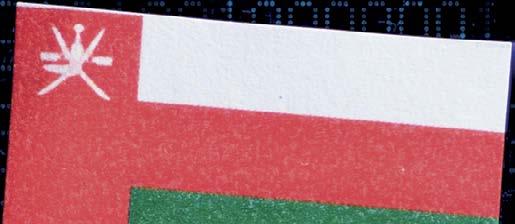

The Real Beneficiary Register shall be kept at the company’s headquarters mentioned in the Commercial Register, and may be kept electronically, in a manner that enables the company to provide and submit the data mentioned therein to the Ministry within 3 working days from the date of such request.
(Source: Lexis Middle East Law)
L AW FOCUS | Lexis Middle East Law Alert | March / April 2023 | www.lexis.ae 15
© Getty images/iStockphoto
Case No .... Fadi Sabsabi v Devisers Advisory Services
LLC, QFC Case No. 0019/2021. 25 January 2023
Jurisdiction .... QFC, Qatar Court .... QICDRC, Court of First Instance
Recommended by .... Alexander Whyatt and Samir Khatib, Eversheds Sutherland (International) LLP
WHAT IS IT ABOUT?
This was an application filed by Devisers Advisory Services LLC represented by Eversheds Sutherland (International) LLP, requesting a review of the Registrar’s cost assessment which awarded Fadi Sabsabi reasonable costs in connection with the underlying proceedings, Fadi Sabsabi v Devisers Advisory Services LLC [2022] QIC (F) 5. The QICDRC Court of First Instance made a finding of fact that from the outset neither party had had legal representation and the pleadings, witness statements and other documents filed on both sides bore ‘the hallmark of lack of legal training and experience’. At no point during the proceedings had Sabsabi noted he was legally represented. However, the Court awarded Sabsabi his reasonable legal costs. In an application for legal costs before the Registrar, Sabsabi submitted invoices from a local law firm for QAR110,000 which referred to assistance and representation in respect of the Proceedings. Devisers requested a detailed cost assessment and disclosure of additional substantiation and explanation. In the Cost Assessment, the Registrar noted the submission of invoices for legal representation by Sabsabi was ‘something of a surprise’ and only when pressed, had he ‘drip-fed material in support of his claim for costs’. The Registrar accepted concerns about whether the amounts had been incurred, and it was noted this concern was not, at least initially, without reasonable foundation. The Registrar found ‘curiosities’ in the invoices and agreed the explanation of the legal assistance Sabsabi had received ‘appeared to change as time went on’. An apparent discrepancy between the period covered by the invoice and when work actually commenced was also noted. However, the Registrar found Sabsabi should be awarded QAR70,000 in costs. Devisers challenged the Cost Assessment on the basis that the

Registrar had erred in exercising his wide discretion when making an order for costs; and misdirected himself as to the burden of proof test.
WHAT WAS DECIDED?
The Court found that the Registrar had erred in his application of his wide discretion when making an order for costs and reversed the Cost Assessment, ordering Sabsabi was not entitled to his costs. It was found it would generally be contrary to the overriding objective (i.e. to deal with cases justly) to require a party in this position to pay legal costs incurred by the opposing party when they had given the impression they were not legally represented. It stresses the importance of openness and transparency on a party’s representation.
Case No .... ADCC Case No. 1045/2022, 18 January 2023
Jurisdiction .... Abu Dhabi
Court .... Abu Dhabi Court of Cassation
Recommended by .... Wasel & Wasel
WHAT IS IT ABOUT?
Two parties in a construction contract agreed all disputes would be subject to the International Chamber of Commerce Rules of Arbitration and the arbitration would be seated in Abu Dhabi.
The arbitration award was challenged by one party before the Abu Dhabi Appeals Court. The Appeals Court found it had no jurisdiction and jurisdiction was exclusive to the ADGM Courts because the arbitration agreement was subject to the ICC Rules and the ICC had a representative office in the ADGM. The losing party petitioned the Abu Dhabi Cassation Court to overturn the judgment.
Relying on provisions of the Federal Arbitration Law (Federal Law No. 6/2018) and Abu Dhabi Law No. 4/2013 (On the ADGM), the Court of Cassation ruled that all disputes arising from or in connection with the contract were to be finally decided by arbitration subject to the ICC Rules, the laws of the UAE, and seated in the Emirate of Abu Dhabi.
It was not disputed that the ICC had opened a branch in Abu Dhabi during the arbitration procedures
© Getty images/iStockphoto C ASE FOCUS www.lexis.ae | March / April 2023 | Lexis Middle East Law Alert | 16
and before the arbitration award was issued. The ICC branch in the ADGM was considered an ICC representative office, and an ADGM establishment. Therefore, the place of arbitration was the ADGM, and it was subject to Abu Dhabi Law No. 4/2013.
The Cassation Court upheld the Appeals Court finding that the ADGM Courts had exclusive jurisdiction over challenges against the arbitration award because the arbitration agreement was subject to the ICC Rules and seated in Abu Dhabi, because the ICC representative office in the ADGM was considered an ADGM establishment. The ratio decidendi of the Abu Dhabi Cassation Court may apply across the UAE, including before the Dubai Cassation Court and Federal Supreme Court, as the reasoning relied on the provisions in Federal Law No. 6/2018 which applies on a Federal level across the UAE.
Therefore, the analysis that the ICC representative office encapsulated arbitrations seated in Abu Dhabi to the ADGM, may also arguably apply to arbitrations seated elsewhere in the UAE. So, it is more necessary for parties with arbitrations seated in the UAE to agree on the courts with jurisdiction over the arbitration procedures, and not just rely on agreement on the seat of arbitration as an indicator.
Case No .... Qatar Financial Centre Authority v Horizon Crescent Wealth LLC and others, QFC Case No. 0019/2020, [2022] QFC (F) 22, 22 November 2022
Jurisdiction .... QFC, Qatar Court .... QICDRC, Court of First Instance
Recommended by
.... Crowell & Moring LLP
WHAT IS IT ABOUT?
The Court of First Instance heard a summary judgment application by the Qatar Financial Centre Authority (QFCA) against Horizon Crescent Wealth LLC and six of its wholly owned subsidiaries as Qatar Financial Centre entities who had failed to pay corporation tax, resulting in penalties, and late payment charges as a debt to the QFCA under Article 142(2) of the QFC Tax Regulations. Horizon also faced claims of having fraudulently or negligently filed an incorrect tax return to the QFCA.
The question was whether the defendant and their wholly owned subsidiaries were liable for purported tax violations under the QFC Tax Regulations, particularly violations of Article 119 of the QFC Tax Regulations, which deals with financial sanctions for improper and late filings of tax returns, and sanctions where a QFC entity has fraudulently or negligently filed an incorrect return.
It was decided Horizon and their wholly owned subsidiaries were all liable for their respective breaches under the QFC Tax Regulations. The Court ordered the defendants to pay around QAR 10 million in sanctions. It also decided that the orders should be made against the defendants individually as each was a separate legal person. The case was dealt with on a summary basis in the interests of justice as the defendants had
no prospect of successfully defending the claim and there was no other compelling reason for the case to be disposed of at trial under Article 22.6 of the Regulations and Procedural Rules of the QFC Court and its related Practice Direction No. 2/2019. The defendants’ failure to properly file their tax returns in a timely manner under the QFC Tax Regulations resulted in them facing financial sanctions of various amounts. This decision stresses the importance of QFC entities properly filing their tax returns with the Tax Department under the QFC Tax Regulations on a timely basis, as failure to do so can result in significant financial sanctions and other undesired consequences, such as negative publicity.
Case No .... Bank Audi Company LLC v Abdulla Ahmed
Al-Semaitt, QFC Case No. 0017/2021, [2023] QIC (F)
1, 23 January 2023
Jurisdiction .... QFC, Qatar Court .... QICDRC, Court of First Instance
Recommended by .... Crowell & Moring LLP
WHAT IS IT ABOUT?
A bank entered into a loan agreement with a company, which was personally guaranteed on a joint and several basis by the individual defendant as the company’s sole owner and manager. The company failed to pay agreed amounts, so the bank filed a claim to recover the amounts due.
The bank filed a claim form with supportive documents and a witness statement, which stated the claim form, and the documents were served on the defendant’s assistant at the company’s address. However, there was no evidence the assistant was authorised to accept such service on the defendant’s behalf. This was not a compliant method of service on an individual defendant under Article 18.3 of the Regulations and Procedural Rules of the QFC Court. To try to effect service, the banks tried on several occasions to serve the documents on the defendant’s registered national address maintained by Qatari authorities, but this was also unsuccessful. The decision stated the defendant and their lawyers, were uncooperative and not prepared to provide any information to enable service.
The claimant filed an application to request the QFC Court order retrospective alternative service on the defendant’s assistant at the company’s address under Article 18.3.5 of the QFC Court Rules, which provides that alternative service may be permitted if directed by the Court.
The Court decided in such exceptional circumstances it ‘can and should’ validate retrospectively a non-compliant method of service under Article 18.3.5 as it could not be in the interests of justice that a defendant, whether an individual or entity, should be able to ‘frustrate such proceedings by deliberately and persistently obstructing service’.
This shows the court will not tolerate deliberate and persistent refusal to accept service by a defendant.
C ASE FOCUS | Lexis Middle East Law Alert | March / April 2023 | www.lexis.ae 17
LEXISNEXIS EVENT CALENDAR
TO REGISTER FOR ALL LEXISNEXIS EVENTS GO TO LEXIS.AE/EVENTS
A DEEP DIVE INTO THE UAE’S INCOME TAX LAW
4 April 2023 - Online event - 9.30AM to 11.30 AM Gulf Standard Time
Join Lexis Middle East, Aurifer and the DIFC Academy for a training session at which our experts, including Thomas Vanhee will look at corporate income tax, income which is exempt from corporate income tax, and how to calculate corporate income tax. There will also be information on how UAE corporate income tax is to be implemented and will impact businesses. For information go to https://www.lexis.ae/events/a-deep-diveinto-the-uae-corporate-income-tax-lawin-person-training/?#registration
LEGAL DRAFTING SKILLS: CONTRACT DRAFTING SERIES
10-12 April 2023- Online event9.30 AM to 11.30 AM UAE Time
Join LexisNexis Middle East and DIFC Academy, SOL International Ltd and Middlesex University for the Legal Drafting Skills: Contract Drafting online training series. During which over a period of three days our experts will focus on different aspects of legal drafting, provide examples and enable participants to also gain hands on experience.
In Part 1 (Day 1) Basic written and spoken communication – Principles and conventions of effective drafting in English common law will be covered. This section will enable participants to understand the foundations and principles of effective legal drafting and appropriate etiquette. It will involve hands-on applications of the pre drafting conference and negotiations, and legal drafting of basic documents required, including correspondence, emails and memos. The first part will cover basic written and spoken communication etiquette, and fundamental principles of drafting basic legal professional documentation as part of effective communication between parties, clients and colleagues. A range of examples will be shared during this session. In the second part of the session, participants will apply these foundations and principles to working examples and
case studies, in order to improve their confidence and give them hands-on exposure to professional communication.
In Part 2 (Day 2) the focus will be Negotiating a contract – English legal drafting. This section will enable participants to understand and apply principles and conventions of formal legal communication during contract negotiation within legal practice. The session will involve the hands-on applications of legal drafting focusing on letters of offer, settlement and negotiation of contracts and other commercial agreements. The first part of the session will cover the fundamental principles of basic legal drafting required for the negotiation of contracts and commercial agreements. A range of examples will be shared. While in the second part, participants will apply these conventions to working examples and case studies, in order to improve confidence and provide hands on experience of legal drafting required during contract negotiations. Part 3 (Day 3) will focus on drafting a contract - English legal drafting. The first part will introduce the methodology to be follow when finalising the structure and drafting contract clauses. Examples will be shared. In the second part, participants will apply this methodology to working examples to
improve confidence and get hands-on experience in legal drafting required during a contract agreement. For further information go to https://www.lexis.ae/ events/legal-drafting-skills-series-onlinetraining/?#registration
DECODING CRYPTO CURRENCY AND BLOCKCHAIN FOR LAWYERS
18 May 2023 - In person event taking place at The Academy at DIFC - 9am to 11.00 am UAE Time Blockchain has revolutionised how work is done.
Digital assets such as cryptocurrency have drastically altered the investment landscape.
Join LexisNexis Middle East, Morgan, Lewis & Bockius LLP (Dubai, UAE) and the DIFC Academy for an in person training at which our experts, including Alishia K Sullivan, Partner, Morgan, Lewis & Bockius LLP (Dubai, UAE) aim to explain how cryptocurrency works and the scope of the new regulatory framework.
During the session they will identify common unlawful activities where cryptocurrencies are used. For information go to https://www.lexis. ae/events/decoding-cryptocurrencyand-blockchain-for-lawyers-in-persontraining-at-the-academy-at-difc/
www.lexis.ae | March / April 2023 | Lexis Middle East Law Alert | 18 EVENTS
IN-HOUSE PROFILE
VICE PRESIDENT - LITIGATION – PROPERTY Technological foundations
Haytham Alieh, Vice President of Litigation at Damac Group works for a business with property and construction at its heart, but it is technological law changes he is most eager to see being adopted following the UAE’s pioneering work in this area.
ABOUT YOU?
I am Lebanese lawyer with over 27 years of experience. I studied law at the Lebanese University in Beirut –Lebanon and became a fully licensed lawyer with the Beirut Bar Association in 1999.
In 2000 I opened my own law office in Beirut, where I specialised in corporate and dispute work and worked in Lebanon until 2009. During that time, I had a range of clients including banks, companies, individuals and several governmental entities.

In 2009 I joined Habib Al Mulla and became the head of their Abu Dhabi litigation team until 2016. I have also worked with other law firms in the UAE, including DWF and BSA Ahmed Bin Hazeem where I was a partner and the head of litigation team. However, in October 2021 I decided to move inhouse and joined Damac as a Vice President and head of Litigation.
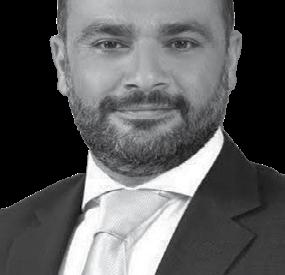
YOUR COMPANY
I work for Damac Group who are one of the biggest real estate companies in the UAE and the region. We have international projects in a large number of countries, including the GCC, Middle East, Europe, North America and the Maldives.
Damac works in real estate, construction, hospitality, data centre, fashion, logistics and food. Our operations include real estate and construction, where we provide residential, commercial and leisure property.
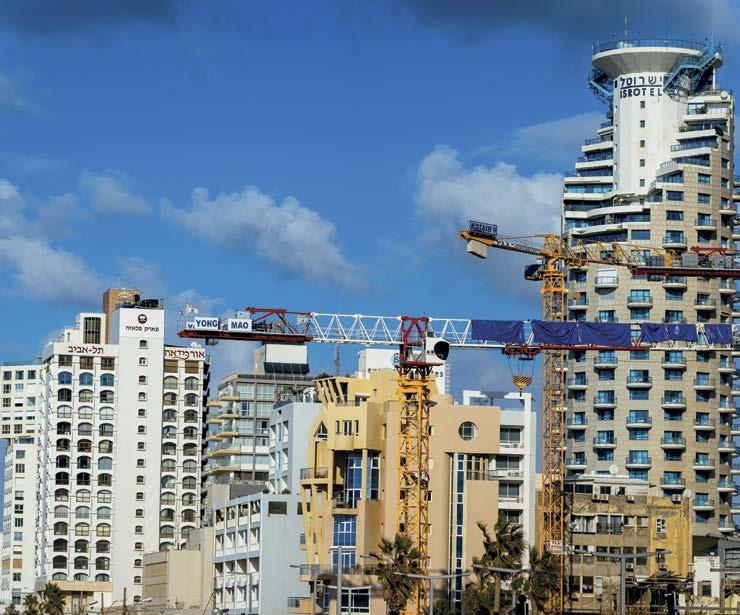
We are listed on the Dubai Financial Market and in 2013 became the first Middle East real estate company to list on the London Stock Exchange.
Our company is involved in a wide range of sectors.
However, we are also interested in giving back to society and our work can involve humanitarian aspects, such as giving to charity and helping others, as we have been doing with the recent earthquakes in Turkey and Syria.
We are also a high-tech company and are always looking to introduce new technology into our day-today operations.
For example, we have a new division called D-Labs which was launched last year and is building digital cities in the metaverse.
YOUR ROLE
In my role as a Vice President and head of the litigation team at Damac Group, I have to cover several countries including UAE, Saudi, Kuwait, Lebanon, Jordan, and Turkey.
I head a team of 17 people including lawyers and support staff. I supervise the legal work for the countries I cover, even though my main role is litigation.
I also have to cover a lot of corporate and internal legal work and provide management with high level legal advice and assistance on any internal labour matters and governance.
Advising on any new laws or procedures which are likely to have an effect on the business also comes within my remit.
WORKING IN THE UAE
I have worked in a number of jurisdictions and the main difference you notice with working in the UAE is that there is lots of legal change and high-tech programmes and initiatives are regularly introduced here.
The courts and official departments tend to operate using the best methods and are also keen to use the best technology possible.
CHALLENGES
My main challenge is to always be one step ahead of developments, understand the impact they will have on our business and have the right method to resolve
IN-HOUSE PROFILE | Lexis Middle East Law Alert | March / April 2023 | www.lexis.ae 19
©
Getty images/iStockphoto
PRACTITIONER PERSPECTIVE
UAE legislators have been keen to support technological change with new pioneering laws and regulations. Ayesha Karim explains how the recently issued Virtual Asset and Related Activities Regulations are supporting the implementation of Dubai Law No. 4/2022 and this emerging sector.


Last year Dubai Law No. 4/2022 Regulating Virtual Assets in the Emirate of Dubai was issued and established the Dubai Virtual Assets Regulatory Authority (VARA) which regulates the virtual assets sector, related activity and Virtual Asset Service Providers (VASPs) in Dubai and Dubai Free Zones except the DIFC.
Virtual assets are defined as digital representations of value that may be digitally traded, transferred, or used as an exchange or payment tool, or for investment purposes. They include Virtual Tokens, and any digital representation of any other value as determined by VARA. In February 2023 the Virtual Assets and Related Activities Regulations 2023 were issued to help implement this new law.
The Regulations are part of the development of a system to license and monitor Virtual Assets to ensure compliance with UAE and international laws on money laundering and terrorist financing, and mandatory UAE Central Bank requirements.
The Regulations have established a detailed regulatory framework for Virtual Assets, which includes VARA’s general and specific supervision and enforcement powers and the development of a system with which to legislate and regulate Virtual Assets in the UAE.
These Regulations give VARA authority to classify Virtual Asset activities, define permitted and prohibited activities and specifically prohibit the issue of Anonymity-Enhanced Cryptocurrencies and all Virtual Asset Activities related to them. They take into account Federal Decree-Law No. 20/2018 on Anti-Money Laundering, Combating the Financing of Terrorism and Financing of Illegal Organisations, Federal Law No. 7/2014 on Combating Terrorism Offences and any other federal legislation involving money laundering, terrorist financing, financing of unlawful organisations or non-compliance with sanctions.
VARA has been designated as the Supervisory Authority for Dubai for all Virtual Asset and Virtual Asset Service Provider Activities; and is responsible for money laundering regulation. It also supervises compliance with relevant Federal Anti-money laundering and Counter Terrorist financing law in Dubai.
In addition, VARA has the right to formulate rules, directives and guidance for Virtual Assets.
They can also set out licensing requirements and fees for Virtual Assets. A detailed list of activities which a Virtual Asset Service provider can be licensed to do is also provided, and those Service Providers must also comply with four VARA Rulebooks - the Company Rulebook; the Compliance and Risk Management Rulebook; the Technology and Information Rulebook; and the Market Conduct Rulebook.
In addition, the Regulations require compliance with Activity specific VARA Rulebooks at all times. Currently there are seven such rule books - the Advisory Services Rulebook; Broker-Dealer Services Rulebook; Custody Services Rulebook; Exchange Services Rulebook; Lending and Borrowing Services Rulebook; Payments and Remittances Services Rulebook; and VA Management and Investment Services Rulebook.
The Regulations also define prohibited practices and market offences such as insider dealing; unlawful disclosure; and market manipulation.
There are also specific rules on market sounding. In addition, when it comes to marketing and promotional activity, VASP must comply with the Administrative Order No. 1, 2/2022: Relating to Regulation of Marketing, Advertising and Promotions Related to Virtual Assets when undertaking marking and promotional activities.
VARA will also be able to impose penalties for non-compliance which could include suspension or cancellation of licenses or financial penalties which can either be a fixed sum or a percentage of any financial loss caused by any non compliance and infractions.
or adapt to them. I have to be constantly creative and be able to think of new ways of delivering our work which means I have to have a flexible mindset.
In the UAE new laws and amendments are being regularly issued. However, the changes happening in technology and crypto currency are definately having an effect on us.
There aren’t any obvious changes I would like to see being made to the UAE legal system at present. However, what I would like to see would be other jurisdictions taking the same approach
to technological change we have here in the UAE and being more willing to adapt to these types of changes, as happens in the UAE.
INDUSTRY CHANGE
The involvement of technology in our industry is huge. Old methods we used to work with are now obsolete and we have even seen robots acting as lawyers so I believe technology will always have a big impact in the future and will force us to change with it.
IN-HOUSE PROFILE www.lexis.ae | March / April 2023 | Lexis Middle East Law Alert | 20
Ayesha Karim Advocate and Legal Consultant
MOVERS AND SHAKERS
A ROUND-UP OF THE TOP APPOINTMENTS AND PROMOTIONS
NEW OPENINGS IN SAUDI
Addleshaw Goddard has announced it is applying to open a new office in Riyadh in Saudi Arabia.

The team of 13 will be led by Andrew Johnston, Head of Addleshaw Goddard’s Middle East and Asia team.
As a result, the firm has hired three new partners. These include Ibrahim Siddiki, who previously led the Saudi Arabia corporate M&A practice at Bracewell in Dubai. He has been joined by Homam Khoshaim, who is also an M&A specialist


BANKING ON EXPANSION
International law firm Gibson, Dunn & Crutcher LLP has taken on Laleh Shahabi as a banking and finance partner in their newly opened Abu Dhabi office. Laleh will work as a member of the firm’s Projects and Infrastructure and Finance practice groups. Her work focuses on advising corporate sponsors, governments, government related entities and financial institutions on a wide range of banking and financial transactions, including project financing and refinancing, leveraged and acquisition financing, direct lending and general corporate financing. In the past she has worked on a wide variety of project finance and development transactions in Europe, the Middle East and Asia, with a focus on the transitional energy, renewables, and the oil and gas sectors. Gibson, Dunn & Crutcher LLP has 20 offices worldwide, including an office in Dubai and now Abu Dhabi. With the opening of their new office, they have recently recruited a number of partners in the region,

EY IN SAUDI
Ernst & Young (EY) has launched a dedicated legal practice in Saudi Arabia which will be led by the Saudi legal expert Reema A Aref. Reema is a Saudi licensed lawyer with over ten years’ experience. She worked for four years in corporate and tax law for EY in Riyadh as their director of corporate and tax law. This included her establishing a legal tax controversy service which was intended to bridge the gap between lawyers and accountants. Prior to that she worked as a tax appeal specialist
and who previously worked at Latham & Watkins, as a banking and finance specialist.

In addition, Projects and Infrastructure partner Alex Sara, who was previously based in Addleshaw Goddard’s Dubai office will also be relocating to the new Saudi office. The new team will include experts in corporate, banking and finance law, those with experience of infrastructure projects and experts in a range of sectors including energy, oil and gas, renewables, transport, technology, hospitality, manufacturing and consumer goods. The firm also currently has offices in Oman and Qatar.
at the Zakat, Tax and Customs Authority (ZATCA). having begun her career as a general corporate and commercial lawyer at Saudi Aramco.
The new E&Y team in Saudi will provides clients with corporate and commercial legal advice on areas including mergers and acquisitions, joint venture agreements, other types of corporate transactions, financial services, energy and infrastructure projects, foreign direct investment and entity establishment.
A NEW NAME IN SAUDI
Clifford Chance has a new joint venture with Abuhimed Alsheikh Alhagbani Law Firm (AS&H) in Saudi Arabia. Clifford Chance has worked with AS&H since November 2016, and the new structure will allow AS&H lawyers and business staff to access to Clifford Chance’s training programme. Existing AS&H Managing Partner, Dr Fahad Abuhimed, will remain in his current role in the new firm. AS&H was formed by three former Clifford Chance lawyers - Majid Al-Sheikh, Mansoor Al-Hagbani, along with Dr Fahad Abuhimed (who has also been a deputy minister at the Saudi Ministry of Commerce and Investment).

In addition, Guy Norman who was previously Clifford Chance’s Global Head of Corporate and has also spent time as Head of Corporate in the Middle East will be moving to the region as the Senior Clifford Chance Partner to help integrate the new joint venture into the global firm.

LOOK EAST
Seung-Hyeon (Alex) Kim has joined as a Partner in Al Tamimi & Company’s Korea Group. Established in 2012, the group supports and advises Korean companies with their legal requirements when doing business in the Middle East and North Africa.
Seung-Hyeon (Alex) Kim has experience in advising major Korean engineering, construction, and manufacturing companies on projects across the East Asian region. His other areas of expertise include International arbitration and litigation, construction, energy, and project finance. Al Tamimi has a number of other country groups which specialise in countries including China, India, Turkey, and a number of jurisdictions within Africa.
Other changes at Al Tamimi have included the appointment of Philip Kotsis as the firm’s new Head of Saudi Arabia.
OTHER CHANGES
Al Tamimi & Company: Sonya Syan has been appointed the Head of Knowledge Management at Al Tamimi. The Kenyan qualified lawyer will be responsible for the firm’s knowledge strategy in 17 offices and 10 countries.



Norton Rose Fulbright: Peter Scott has been reappointed managing partner for Europe, Middle East and Asia (EMEA) at Norton Rose Fulbright for a second term with effect from 1 April 2023.
Afridi & Angell: Saurbh Kothari, Mevan Bandara, and Abdus Samas are now Partners at Afridi & Angell.

AND SHAKERS | Lexis Middle East Law Alert | March / April 2023 | www.lexis.ae 21
MOVERS
In association with
Kotsis who has been at Al Tamimi for over 13 years as Partner within the firm’s Corporate, Commercial, Mergers and Acquisitions practices will oversee operations in their three Saudi offices, located in Riyadh, Jeddah, and Al Khobar. He was also the Head of the firm’s Kuwait office and this role will now be held by Omar Handoush.
Handoush has been with Al Tamimi for over eight years and has spent time working as a Partner in the Banking & Finance Practice.
OVER IN EGYPT
Clyde & Co has announced plans to open an associated office in Cairo in conjunction with Barakat, Maher & Partners Advocates & Legal Consultants. The new office will be led by Managing Partner Mohamed Barakat who is a US-qualified lawyer with more than 17 years of experience who has worked in the US and Saudi Arabia. He will also be joined by Partner Sherif Ali Maher. Sherif is a disputes lawyer who joined Clyde & Co in 2013. Others at the new firm will include Egyptian qualified lawyers Mostafa Elsakaa and Sameh Dahrouq. Areas covered will include capital markets, corporate and M&A, commercial, commercial disputes and international arbitration, employment, finance, regulatory, and restructuring matters. The new team has experience of advising clients in the education, energy and natural resources, healthcare, hospitality, infrastructure, insurance and reinsurance, marine, professional practices, retail and consumer, and trade and commodities sectors. Meanwhile over in Saudi there have been two new Partners in the Riyadh office. The first, corporate commercial lawyer Mohammed Almarzouki, advises family businesses, investors, and corporations on M&A, joint ventures, capital markets and general corporate advisory matters. He is a licensed lawyer in Saudi Arabia, and also a qualified attorney in the State of New York, and in England and Wales. Prior to joining Clyde & Co, he co-founded the Alzawawi and Almarzouki Law Firm in Jeddah. He has also worked in the past for Allen & Overy in the UK, Khoshaim & Associates in Saudi Arabia, and Saudi Arabian Airlines (SAUDIA). The second, Anas Alswailem, previously managed his own private office in Saudi Arabia and has extensive experience working for large governmental organisations including the Saudi Arabian
General Investment Authority (SAGIA) and the General Organisation for Social Insurance (GOSI). He will advise clients on corporate and commercial matters.
IN DISPUTE
Over at Charles Russell Speechlys the Dispute practice is expanding and the changes include the appointment of a new Partner, John Lewis in their Dubai office. Lewis is an experienced commercial litigation and arbitration practitioner in the UAE market. He has developed a specialist practice within the regulatory, audit, advisory and consulting sectors which focuses primarily on professional indemnity defence related instructions and commercial litigation and arbitration matters. His work covers a wide variety of disputes before civil law, common law and international arbitration tribunals in the Middle East. He also regularly sits as an arbitrator in arbitration proceedings.
Alim Khamis has also joined the Charles Russell Speechlys Litigation and Dispute Resolution team but this time in Qatar. Khamis who is a dual-qualified lawyer in Australia and Canada, and specialises in construction disputes, with a focus on domestic and international arbitration. Throughout this career, he has worked across multiple jurisdictions and project managed large international teams on arbitrations spanning Asia, the GCC and Australia. He has over a decade of experience of acting for clients in highvalue disputes within the construction, infrastructure, and energy sectors.




TAX MATTERS
FTI Consulting have appointed a tax expert Naishadh Soneta as Managing Director of their Corporate Finance and Restructuring department in Dubai. Soneta has over 12 years of experience in indirect tax matters. In the past he has worked in the Big Four and advised a range of multinational and domestic organisations on issues including Goods and Services Tax implementation and
SEND US YOUR NEWS
impact assessment, end-to-end VAT transition and implementation, indirect tax strategy and optimisation and tax diagnostic reviews and due diligence projects. He has experience of work with the real estate, education, healthcare, energy and retail sectors. This follows other recent appointments designed to strengthen the firm’s tax capabilities including Nilesh Ashar who has been appointed Senior Managing Director Dubai and will lead the firm’s tax advisory team across the region.
DWF AND DATTANI
A new financial services partner has been appointed at DWF in Dubai. Bhavesh Dattani specialises in financial services regulation and financial crime compliance. He previously worked at British Arab Commercial Bank plc in London, where he was general counsel and chief compliance officer. He is a UK-qualified regulatory and compliance transactional and advisory lawyer who has over 20 years of multijurisdictional financial services legal and compliance experience.
FULL OF ENERGY
King & Spalding have appointed energy, infrastructure and project development specialist Dan Feldman as a partner in their Corporate, Finance and Investments (CFI) practice group. Feldman will be based in the firm’s Abu Dhabi office. He will advise on projects and transactions across the full range of traditional and green energy technologies, including renewables, hydrogen, oil and gas, power, infrastructure and mining megaprojects around the world. He has particular experience of clean energy, carbon management, and the green industry space, and will work with lawyers across the firm’s global offices to deliver integrated project and transaction delivery solutions worldwide. He previously worked at Shearman & Sterling, where was Co-Head of their Energy Innovation section and leader of their Global Hydrogen/Ammonia Industry Team.
If you have news of an appointment or promotion within the legal or financial professions you would like to see reported in Lexis Middle East Law, please send details to: corinne.joseph@lexisnexis.com
MOVERS AND SHAKERS www.lexis.ae | March / April 2023 | Lexis Middle East Law Alert | 22
Opportunities in the Middle East with Jameson Legal
Jameson Legal is an international legal recruitment company founded in 2010, with specialist divisions for private practice, in-house, interim, and legal tech. We act for client law firms and companies and advise qualified lawyers from NQ to equity partner level, as well as paralegals, compliance professionals, and legal tech professionals.
Saudi Arabia
In- h o use L aw ye r, 5+ PQ E, En e rg y Fo cuse d
Our client is redefining the concept of sustainable living and seeking to develop one of the most vibrant and interconnected projects in the world. They are looking to recruit exceptional lawyers qualified in any jurisdiction with over five years’ experience, and a focus on either the energy or water sector.
Ref: JRS-PM-13376
Saudi Arabia
Real Est a t e D eve l o pm e nt L aw ye r, 10+ PQE, Inn ova t i ve Proje c t

This is an exceptional opportunity for a lawyer to advise on a major new real estate development project featuring luxury hotels and related leisure facilities. Candidates should have over ten years’ experience, with a focus on the real estate development, preferably in the hospitality sector. Ideally, candidates will be qualified in either the US, Canada, UK, Australia, or New Zealand.
Ref: SSK-IS-13650
Saudi Arabia
Seni o r Le gal Co uns e l, 5 + P QE, Ge n e ral Ad v iso r y
Our client is offering an unparalleled opportunity to be a part of a project that has a core aim of promoting a thriving economy and enriching the wellbeing of its people. The role will involve advising on various legal matters such as corporate, M&A, commercial, and real estate development. Applicants should have more than five years’ legal experience, and be qualified in either the US, Canada, UK, Australia, New Zealand, or Saudi Arabia.
Ref: SSK-IM13728
Dubai
Co rp o ra te M&A Co uns e l, 3+ PQE, Onlin e Te chn o l o g y S e c tor
One of the region’s most innovative companies is looking to recruit a Legal Counsel to focus on corporate M&A and project finance. Applicants must have qualified from the UK, US, New Zealand or Australia, with at least three years’ experience working for leading international law firms and/or in-house teams.

Ref: RPG-IL-13706
Le ga l Co uns e l, 4+ PQE, Le ading In ve stm e nt F und
A leading investment fund is seeking to hire an experienced lawyer for their legal team to work closely with the General Counsel and other Senior Counsel. Candidates must be qualified in the UK, Australia, or New Zealand, with at least four years’ experience focused on M&A work.
Ref: RPG-IM-12039
Abu Dhabi
Le ga l Co uns e l, 3+ PQE, Man uf ac t ur ing
A manufacturing company with significant local backing are recruiting a Legal Counsel to support their General Counsel on a range of in-house work. The role will involve a range of matters, including general commercial contracts and drafting, sales agreements, and employment contracts. Applicants should have at least 3 years’ experience gained at a reputable law firm.
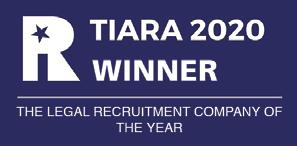
Ref: IJR-IM-13664
Qatar
Asso cia t e Dire c to r, 8+ PQ E, Le gal a nd Re gula t o r y Finan cial Ser v i ces
Our client is looking to hire a specialist Legal Counsel to focus on regulatory financial services work, advising on the interpretation and application of laws, regulations, and rules relating to the operation of financial markets and the conduct of financial services business. Candidates must be at least eight years’ qualified with relevant experience gained from leading banks or reputable law firms.
Ref: IJR-IM-13625
Qatar
Dubai Seni o r Co unse l, 10+ PQ E, Tra ding a nd Mar ke t ing
A leading O&G producer is hiring a Senior Counsel for its Trading and Marketing department. The successful applicant will support the trading of physical LNG, commodity derivatives, petrochemicals, and fertilisers. Applicants must have at least 10 years’ experience with a focus on trading and compliance, and be qualified in either the UK, US, Australia, New Zealand, or an EU jurisdiction.
Ref: IJR-IM-13208
For more information or to discuss any of these roles please contact Iain Rainey at iain.rainey@jamesonlegal.com , or Jeremy Small at jeremy.small@jamesonlegal.com
DISPUTE RESOLUTION FOCUS
CASES AND UPDATES
Sponsored by Al Aidarous
In my experience...
Waleed Hamad - Head of Litigation at Al Aidarous discusses his experiences of past cases and advice to those considering initiating a dispute.

YOUR BACKGROUND
I began my career 21 years ago in Egypt where I trained at one of the largest full-service law firms in Cairo. In the early 2000s, I moved to the UAE to join a wellestablished law firm here and spent 10 years gaining experience in a range of practice areas, including commercial, construction, banking, and real estate law. The UAE and Egyptian legal systems are very similar, in the approach you would take but there are slight differences between the two administrative systems.

YOUR ROLE
In 2010, I joined the Al Aidarous litigation department. where I am now a Partner and the Head of Litigation. I oversee the firm’s litigation department which comprises a number of teams specialising in different areas, e.g. commercial and civil disputes and construction and real estate litigation. I have had the opportunity to work with most of the authorities across the country and before different courts in the UAE, which has given me a better understanding of the legislator’s mindset and how the laws are actually implemented.
I have been involved in many high-profile cases in a range of different fields, and this has enhanced my knowlege and honed my skills as a lawyer.
Our firm also works closely with international clients and foreign law firms, which has helped me to better understand the approaches and views taken by lawyers from different jurisdictions, especially those from common law jurisdictions. One of my specialisms is the real estate sector. Real estate cases tend to depend more on specific real estate legislation, while construction cases are governed by civil and commercial law.
With construction cases you must often rely more on technical and factual issues, while real estate cases tend to depend more on the parties’ agreements, and the application of real estate legislation.
RECENT COURT CASES
Recently we defended a client against a governmental entity before Abu Dhabi Court. This dispute involved
a manufacturing defect. Although, despite all our efforts the court of cassation dismissed our arguments, we did not stop fighting as we truly believed the court had not addressed our client’s position or our legal grounds. Consequently, we decided to file a motion for a retraction before the Abu Dhabi Special Judicial Body of the Court of Cassation.
Against the odds, not only did we succeed in convincing the court to accept our motion, the court ultimately reversed its decision and dismissed the case against our client.
Again, our litigation team is currently handling one of the most complicated cases involving a dispute over the ownership of a very high-profile, high-value company. We have had to deal with different conflicts of jurisdiction, conflicts of laws and had to explain to the court foreign legal concepts uncommon in the UAE.
Finally, my advice to those thinking of filing a claim is to first request a pre-filing assessment, to better understand their legal position, and assess the evidence and pros and cons of initiating the dispute.
Depending on the outcome, it might be better to either consider an amicable settlement if the objective can be achieved and maintain the relationship with the other party but if the dispute is inevitable, then you should be aware of the risk and chances of success in terms of both a successful judgment and actual recovery.
My final piece of advice would be to file a case with full knowledge of the recovery risks.

www.lexis.ae | March / April 2023 | Lexis Middle East Law Alert | 24
© Getty images/iStockphoto
CASE FOCUS
RECENT KEY DISPUTE RESOLUTION CASES
Case No .... ADCC Case No. 40/2022 on 11 January 2023
Jurisdiction ...Abu Dhabi Court ....Abu Dhabi Cout of Cassation
Reported by .... Al Aidarous who represented the fan manufacturer in this case
BACKGROUND
A well-known aviation company based in Abu Dhabi purchased a helicopter from a manufacturer.
The client, in this case was a multinational company and manufacturer of aircraft equipment and components and had supplied one of the components of this helicopter (which was the gearbox oil cooling fan) to the helicopter manufacturer.
Subsequently, on one of the flights, the helicopter pilot received a high oil temperature warning shortly after take-off and decided to land.
Prior to touchdown, the pilot activated the helicopter floatation system in order to evacuate the crew safely.
However, once the crew were evacuated, the system’s inflated bags deflated causing the helicopter to capsize and sink. The helicopter was declared a total loss.
The aviation company made a claim under its insurance policy which was settled for USD12.5 million. As a result, the insurer brought a case against the fan manufacturer before the Abu Dhabi court for the recovery of the sum paid on the basis that the incident leading to the total loss of the helicopter was caused by the malfunction of the gearbox oil cooling fan manufactured by the fan manufacturer.
COURT RULING
The Abu Dhabi Court of First Instance appointed a panel of experts which concluded that the fan manufacturer was liable for the damages.
However, the court did not adopt the report of the experts and instead found that the direct cause for the damages was the deficient floatation system.
This decision was subsequently reversed by the Court of Appeal which ruled that the fan manufacturer was liable for the damages. This ruling was upheld by the Court of Cassation.
RETRACTIONS UNDER UAE LAW
Under UAE law, rulings of the Court of Cassation are final, and binding and they can only be retracted or reconsidered in very exceptional instances.
Given that a matter would have been considered by a two-level trial before the courts of fact and finally by the court of cassation, the Court is extremely
conservative about granting any motion for the reconsideration of a final judgment.
DEFENCES RAISED
As certain key defences raised by the client, which if proven correct could have altered the outcome of the case, were not duly addressed by the Court, the fan manufacturer was advised to file an application for retraction.
This is a recourse that has been very recently introduced in the UAE following an amendment to the Civil Procedures Code by Federal Decree Law No. 15/2021.
Under Article 187 of the amended law, a party against whom a judgment has been issued may file a motion for retraction of a cassation judgment in limited circumstances.
This motion relied on Article 187(c) and it was submitted that the Court of Cassation had misapplied the law and had contradicted the established principle of litigation that the court should review and examine the objections of the parties to the Court appointed expert report, and carefully address all the substantial defences raised by the parties which could have a significant impact on the outcome of the case failing which the judgment would be considered defective and not properly reasoned.
It was submitted that the court had held the fan manufacturer was liable for the total loss of the helicopter by the mere fact that the gearbox oil cooling fan had failed.
However, the court had overlooked two substantial defences.
These were that while such a failure of the fan had necessitated an emergency landing, it was not actually the direct cause for the loss of the helicopter.
In fact, it was the malfunction of the floatation system which had led to the sinking of the helicopter and therefore, the loss of the helicopter was directly caused by that component’s malfunction and not the malfunction of the fan.
In addition, the second defence was that no conclusive evidence had been provided to establish that the malfunction of the fan was due to a manufacturing defect.
DECISION OF THE COURT OF CASSATION
The head court of cassation was persuaded by this submissions and accepted the application for retraction. As a result, the court referred the case to another committee of the court of cassation which ultimately set aside the previous cassation judgment and decided to reject the case which had been filed by the insurance company against the client, the fan manufacturer.
DISPUTE RESOLUTION FOCUS | Lexis Middle East Law Alert | March / April 2023 | www.lexis.ae 25
Hashem AlAidarous of Al Aidarous sheds light on two recent significant developments to the UAE Court system - the introduction of bilingual courts in the UAE and establishment of expert chambers in Abu Dhabi courts.


COURT CHANGES A
rabic is the UAE’s official language and under Article 4 of Federal Law No. 11/1992 (the previous UAE Civil procedure Code which was repealed and replaced as of 2 January 2023 by Federal Decree-Law No. 42/2022) it was also the official language of the UAE courts. This meant that non-Arabic-speaking litigants who appeared before UAE courts were heard through interpreters and had to submit submissions and relevant case documents after they had been translated into Arabic.
From 2 January 2023, as a result of Article 5 of Federal Decree-Law No. 42/2022, although Arabic remains the official language of the UAE Courts, English can now be used in UAE courts in certain circuits and for certain cases. Article 5(2) of Federal Decree-Law No. 42/2022 has paved the way for the development of a new way to litigate before the UAE courts, which may progress in the foreseeable future. The Head of the Federal Judicial Council, or local judicial authority, in Abu Dhabi, Dubai, and Ras al-Khaimah, as the case may be, has been granted an authority to decide that English is to be used as the language of trials; procedures; judgments and orders. However, it should be noted that this use of English would be confined to certain tribunals and UAE court circuits which are dedicated to hearing disputes involving specialised matters, or in a specific case, or for certain proceedings.
These specialised matters may include construction, finance, insurance and intellectual property. In such cases, it would be possible for the litigants, witnesses and lawyers to be heard in the English language. Statements, submissions, applications and other documents relevant to the dispute could also be submitted to these tribunals in English.
EXPERT CHAMBERS IN ABU DHABI


Another significant change which should benefit civil and commercial litigation is the creation of expert chambers in the Abu Dhabi courts. Articles 30 (bis) and 30 bis (1) of Federal Law No. 11/1992 (which has now been replaced by Article 30 and 31 of Federal DecreeLaw No. 42/2022) set the scene for establishing expert chambers within the federal and local judiciary, making it possible to refer all or some of the proceedings which fell within the circuit’s jurisdiction to one or more chambers or circuits presided over by a single judge assisted by two local or international judges.
The establishment of these Expert Chambers is part of the Abu Dhabi court’s efforts to attract foreign investment by diversifying the Commercial Court with experiences with common law.
All documents and court forms are also now available in English as Claimants in civil and commercial cases involving non-Arabic speaking defendants have to translate case files into English.
The Expert Chambers are competent to hear cases including those on civil, commercial and labour matters that are outside the jurisdiction of the minor chambers, real estate cases, and bankruptcy cases. The Chambers consist of four judges, one from the UAE, two from the US and one from the UK.
The experts/judges serve on the major chamber Commercial Courts of Abu Dhabi, on disputes of over AED 1 million, and on panels of three, by assignment or request and primarily target contract disputes where all cases are translated.
Article 30 and 31 od Federal Decree-Law No. 42/2022 now govern the expert chambers of national and international judges.
DISPUTE RESOLUTION FOCUS www.lexis.ae | March / April 2023 | Lexis Middle East Law Alert | 26 Hashem
AlAidarous Al Aidarous
© Getty images/iStockphoto
ARBITRATION FOCUS
RECENT KEY DISPUTE RESOLUTION CASES
Arbitration Institution DIAC (Formerly DIFCLCIA)
Issue.... Request under Article II (3) of the New York Convention, Place, Legal Place, Seat and Venue
Recommended
by....
Al Aidarous
BACKGROUND
Z and X entered into a Contract pursuant to which X was appointed as the contractor for the construction and completion of a Project.
As X failed to deliver the Project by the agreed completion date, X brought a claim against Z before the onshore Dubai courts seeking among other things an extension of time.
REQUEST UNDER ARTICLE II (3) OF THE NEW YORK CONVENTION
Countering X’s Dubai onshore proceedings, Z filed a request for declaratory relief before the DIFC Courts seeking to establish that the arbitration clause was ‘binding’ upon the parties. The DIFC Court of First Instance ruled that in the absence of what the Court considered to be an express request, it did not have jurisdiction to order the referral nor was it obliged to under the New York Convention.
In the Court’s view, Z’s request to declare the arbitration agreement valid and binding was no ‘New York Convention-Request’ and therefore did not empower it to refer the dispute to arbitration.
This reading of Article II (3) raises questions as to the decision’s conformity with the drafters’ intentions.
The Article’s travaux préparatoires explain why the word ‘request’ was added to the provision. The drafters contemplated the situation where neither party raises the existence of the arbitration agreement.
Wishing to avoid mandatory referral where parties mutually agree not to enforce the arbitration agreement, the drafters inserted the ‘request’ requirement as it currently stands.
The DIFC Court’s decision seemed to depart from this rationale and did not stroke with the New York Convention’s object and purpose, which is to ‘facilitate the recognition and enforcement of arbitral awards to the greatest extent possible’.
PLACE, LEGAL PLACE, SEAT, OR VENUE?
As is a common recurrence in arbitration-related litigation, the Court was also confronted with a jurisdictional challenge based on the arbitration’s seat.
It was argued that by using the words ‘the place of Arbitration is Dubai’, the arbitration clause identified onshore Dubai as the seat of the arbitration.
In X’s view this meant that the Dubai onshore Courts had jurisdiction, not the DIFC Courts.
The DIFC Court of First Instance accepted this argument and declined jurisdiction.
Its decision was somewhat surprising for three reasons.
Firstly, the DIFC Courts typically accept curial jurisdiction over arbitrations seated in ‘Dubai’, on the grounds that ‘reference to ‘Courts of Dubai’ or ‘Dubai Courts’, absent context or intention pointing to a different outcome, refers to all the courts within the Emirate of Dubai, including the DIFC Courts’, (see Goel and Others v Credit Suisse (Switzerland) Limited. DIFC Case No. 002/2021 and also Hayri International LLC v. Hazim Telecom Private Ltd, DIFC ARB Case No. 010/2016, [2016] DIFC ARB 010).
It is yet to be seen whether the DIFC Court’s decision in this case signals a more general departure from thisl stance. Secondly, the way the arbitration agreement was drafted raises the question of whether the parties identified a seat at all.
The reference to ‘the place’ of arbitration was included in a provision separate from the main arbitration clause. It did not use the proper terminology typically associated: with the seat of arbitration (i.e. ‘seat’ or ‘legal place’), and the DIFC-LCIA Rules which were in force when this contract was drafted did not require a choice of seat (as Article 16 pointed to the DIFC as the default seat). Nonetheless, the DIFC Court ruled that the reference to ‘place’ was not one to venue, but instead referred to the seat of the arbitration.
Thirdly, it was not argued whether the seat had any relevance in determining the Court’s jurisdiction. Article II (3) of the NY Convention imposes a referral obligation on any ‘Court of a Contracting State’, without differentiating between curial and non-curial courts.
This is a particularly pertinent question considering that the New York Convention is a selfexecuting treaty, meaning it is directly applicable before national courts.
Nearly 65 years after its adoption, Article II (3) of the New York Convention remains fertile source for legal wrangling.
Dubai’s unique jurisdictional maze, combining free zones, on shore courts, and federal courts, forms the ultimate playground for jurisdictional ping pong.
In the midst of this it is important not to overlook that the New York Convention is a self-executing treaty that imposes concrete, not simply aspirational, obligations on its Contracting States’ courts.
DISPUTE RESOLUTION FOCUS | Lexis Middle East Law Alert | March / April 2023 | www.lexis.ae 27
Cloud Services
relating to mandatory minimum terms of cloud services contracts. Some of the mandatory requirements seem better suited to one of these categories of providers than to the other.
INFORMATION PROVISION
Saudi Arabia’s Cloud Computing Regulatory Framework, which is administered by the Communications, Space and Technology Commission (CST formerly known as CITC), introduced a number of mandatory contractual requirements that must be reflected in cloud computing services agreements.

THE FRAMEWORK
The Framework applies to cloud computing services provided to subscribers in Saudi Arabia and sets out information about cloud computing service contracts and their mandatory minimum content.
One of the challenges is that the Framework does not neatly distinguish between (a) cloud service providers that exercise direct or effective control over a data centre or critical cloud computing infrastructure; and (b) providers that provide cloud-based services, such as SaaS services, without controlling data centre or critical cloud infrastructure. Many providers that fall into the latter category assume they must register with CST only to discover the registration requirements really only contemplate cloud service providers under the former category.
A further issue caused by this lack of a ‘neat split’ between provider types is found in the provisions of the Framework
Cloud service providers must provide customers with clear, transparent information about the subject cloud services, terms of service, service levels, the payment mechanism, and the category in which the cloud service provider is registered with CST.
As a minimum, cloud service providers must reflect the following points in any cloud services contracts agreed with customers in Saudi.
SPECIFIC INFORMATION PROVISION
First, service provider details must be provided. This will include their full corporate name, identification details and contact details such as business address.
There must be a description of the subject cloud services, which is basically a statement of the services to be provided and permitted uses.
There must also be service level information, such as information on service availability and any applicable service level commitments.
The term of the cloud service contract must be covered along with a termination provision and details of the mechanism for making customer data available to the customer on termination.
There should also be details of applicable fees, and payment terms along with details of the customer complaint mechanism. There should be information on the rules on handling customer content by the cloud service provider.
Finally, details of the cloud
service contract’s governing law is needed. The Cloud Framework states if the governing law is to be any law other than Saudi Arabian law, that foreign law is unable to nullify rights granted to the customer under the framework.
DISPUTES AND COMPLAINTS
The Framework states that a party to a cloud service contract is entitled to refer any dispute to CST to be resolved in accordance with CST’s dispute resolution procedures.
The Framework also requires providers to provide subscribers with a customer care service to resolve any complaints.
Provision of this customer care mechanism is without prejudice to any other legal remedies and dispute settlement procedures that may be available.
Responsibility for negligence in providing cloud services, and restrictions on the cloud service provider’s ability to limit liability by contract (including in respect of loss of data, cybersecurity incidents, and non-compliance with agreed service levels) also apply to cloud service providers in Saudi Arabia but this does not need to be reflected in the contract.
CONTENT PROVISION
As a minimum, if requested by the customer, cloud service providers must provide them with a copy, in a convenient format, of their content held by the cloud service provider at the time of termination of the service; or provide them with a convenient means of accessing their content at the time of termination.
Alternatively, the provider can transfer the customer’s content, where technically possible, and in a convenient format, to another cloud service provider nominated by the customer.
Contributor Nick O’Connell, Partner and Saudi Head of Digital & Data, Al Tamimi & Company

www.lexis.ae | March / April 2023 | Lexis Middle East Law Alert | 28 CONTRACT WATCH
© Getty images/iStockphoto
